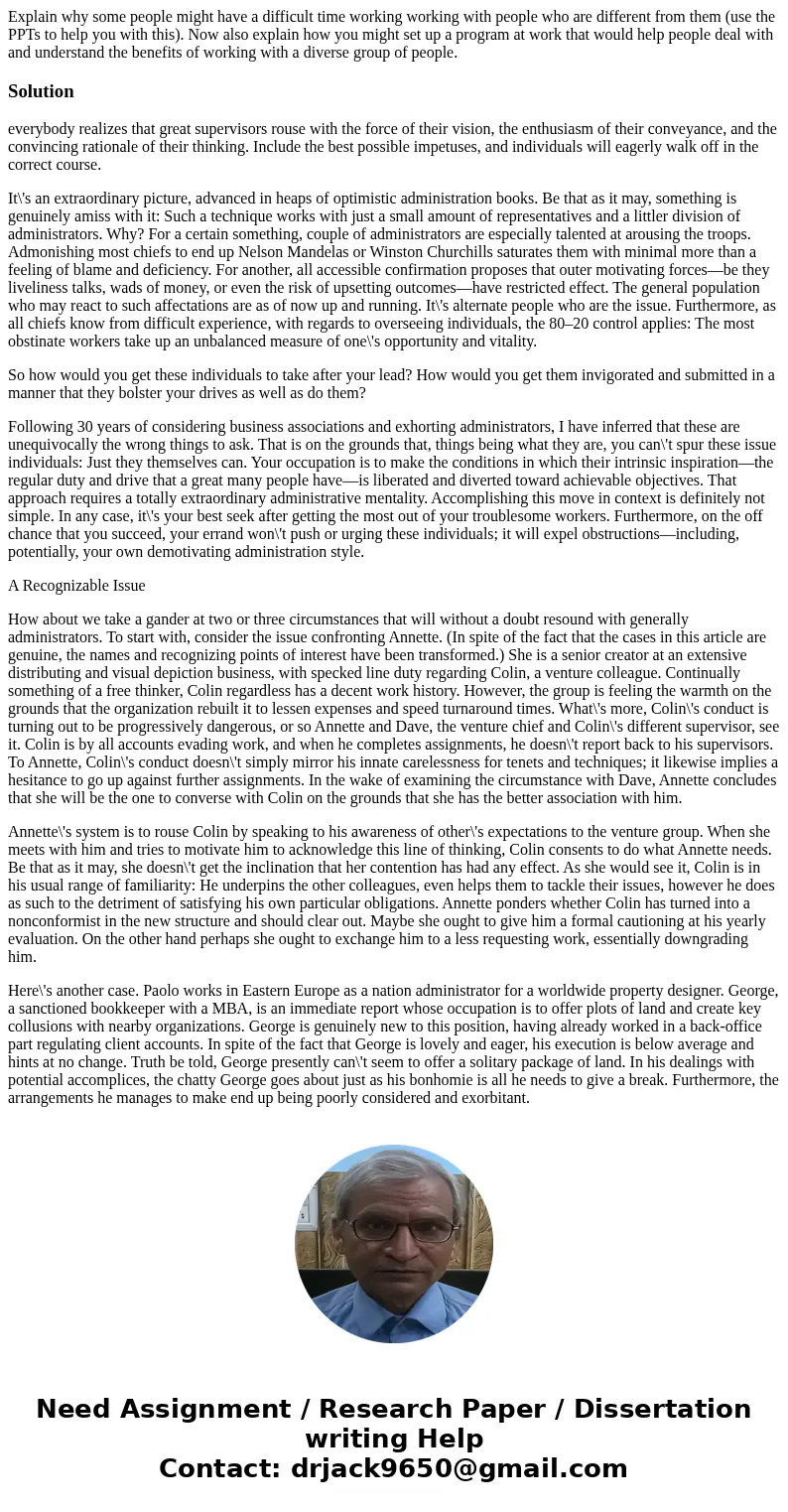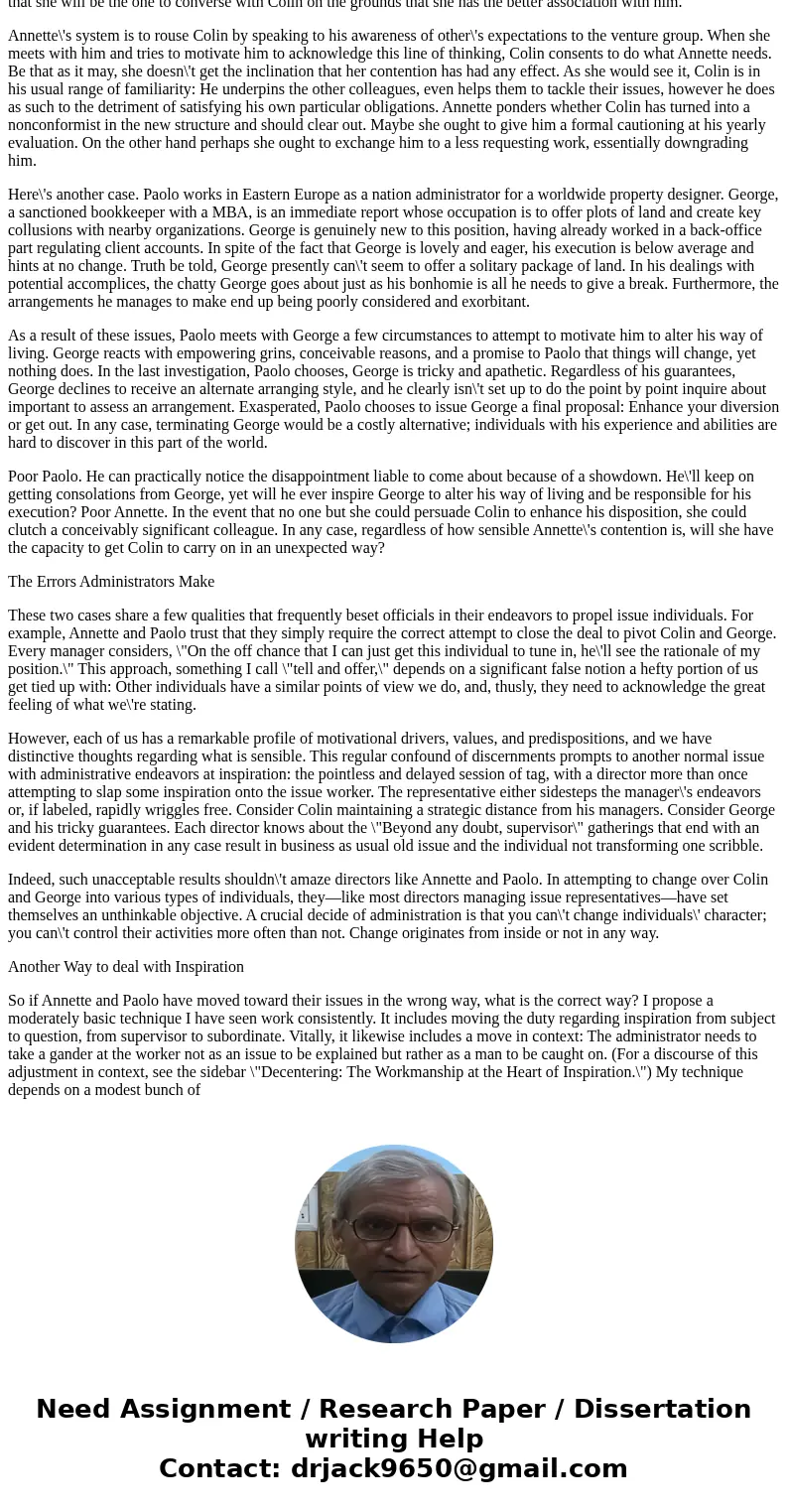Explain why some people might have a difficult time working
Explain why some people might have a difficult time working working with people who are different from them (use the PPTs to help you with this). Now also explain how you might set up a program at work that would help people deal with and understand the benefits of working with a diverse group of people.
Solution
everybody realizes that great supervisors rouse with the force of their vision, the enthusiasm of their conveyance, and the convincing rationale of their thinking. Include the best possible impetuses, and individuals will eagerly walk off in the correct course.
It\'s an extraordinary picture, advanced in heaps of optimistic administration books. Be that as it may, something is genuinely amiss with it: Such a technique works with just a small amount of representatives and a littler division of administrators. Why? For a certain something, couple of administrators are especially talented at arousing the troops. Admonishing most chiefs to end up Nelson Mandelas or Winston Churchills saturates them with minimal more than a feeling of blame and deficiency. For another, all accessible confirmation proposes that outer motivating forces—be they liveliness talks, wads of money, or even the risk of upsetting outcomes—have restricted effect. The general population who may react to such affectations are as of now up and running. It\'s alternate people who are the issue. Furthermore, as all chiefs know from difficult experience, with regards to overseeing individuals, the 80–20 control applies: The most obstinate workers take up an unbalanced measure of one\'s opportunity and vitality.
So how would you get these individuals to take after your lead? How would you get them invigorated and submitted in a manner that they bolster your drives as well as do them?
Following 30 years of considering business associations and exhorting administrators, I have inferred that these are unequivocally the wrong things to ask. That is on the grounds that, things being what they are, you can\'t spur these issue individuals: Just they themselves can. Your occupation is to make the conditions in which their intrinsic inspiration—the regular duty and drive that a great many people have—is liberated and diverted toward achievable objectives. That approach requires a totally extraordinary administrative mentality. Accomplishing this move in context is definitely not simple. In any case, it\'s your best seek after getting the most out of your troublesome workers. Furthermore, on the off chance that you succeed, your errand won\'t push or urging these individuals; it will expel obstructions—including, potentially, your own demotivating administration style.
A Recognizable Issue
How about we take a gander at two or three circumstances that will without a doubt resound with generally administrators. To start with, consider the issue confronting Annette. (In spite of the fact that the cases in this article are genuine, the names and recognizing points of interest have been transformed.) She is a senior creator at an extensive distributing and visual depiction business, with specked line duty regarding Colin, a venture colleague. Continually something of a free thinker, Colin regardless has a decent work history. However, the group is feeling the warmth on the grounds that the organization rebuilt it to lessen expenses and speed turnaround times. What\'s more, Colin\'s conduct is turning out to be progressively dangerous, or so Annette and Dave, the venture chief and Colin\'s different supervisor, see it. Colin is by all accounts evading work, and when he completes assignments, he doesn\'t report back to his supervisors. To Annette, Colin\'s conduct doesn\'t simply mirror his innate carelessness for tenets and techniques; it likewise implies a hesitance to go up against further assignments. In the wake of examining the circumstance with Dave, Annette concludes that she will be the one to converse with Colin on the grounds that she has the better association with him.
Annette\'s system is to rouse Colin by speaking to his awareness of other\'s expectations to the venture group. When she meets with him and tries to motivate him to acknowledge this line of thinking, Colin consents to do what Annette needs. Be that as it may, she doesn\'t get the inclination that her contention has had any effect. As she would see it, Colin is in his usual range of familiarity: He underpins the other colleagues, even helps them to tackle their issues, however he does as such to the detriment of satisfying his own particular obligations. Annette ponders whether Colin has turned into a nonconformist in the new structure and should clear out. Maybe she ought to give him a formal cautioning at his yearly evaluation. On the other hand perhaps she ought to exchange him to a less requesting work, essentially downgrading him.
Here\'s another case. Paolo works in Eastern Europe as a nation administrator for a worldwide property designer. George, a sanctioned bookkeeper with a MBA, is an immediate report whose occupation is to offer plots of land and create key collusions with nearby organizations. George is genuinely new to this position, having already worked in a back-office part regulating client accounts. In spite of the fact that George is lovely and eager, his execution is below average and hints at no change. Truth be told, George presently can\'t seem to offer a solitary package of land. In his dealings with potential accomplices, the chatty George goes about just as his bonhomie is all he needs to give a break. Furthermore, the arrangements he manages to make end up being poorly considered and exorbitant.
As a result of these issues, Paolo meets with George a few circumstances to attempt to motivate him to alter his way of living. George reacts with empowering grins, conceivable reasons, and a promise to Paolo that things will change, yet nothing does. In the last investigation, Paolo chooses, George is tricky and apathetic. Regardless of his guarantees, George declines to receive an alternate arranging style, and he clearly isn\'t set up to do the point by point inquire about important to assess an arrangement. Exasperated, Paolo chooses to issue George a final proposal: Enhance your diversion or get out. In any case, terminating George would be a costly alternative; individuals with his experience and abilities are hard to discover in this part of the world.
Poor Paolo. He can practically notice the disappointment liable to come about because of a showdown. He\'ll keep on getting consolations from George, yet will he ever inspire George to alter his way of living and be responsible for his execution? Poor Annette. In the event that no one but she could persuade Colin to enhance his disposition, she could clutch a conceivably significant colleague. In any case, regardless of how sensible Annette\'s contention is, will she have the capacity to get Colin to carry on in an unexpected way?
The Errors Administrators Make
These two cases share a few qualities that frequently beset officials in their endeavors to propel issue individuals. For example, Annette and Paolo trust that they simply require the correct attempt to close the deal to pivot Colin and George. Every manager considers, \"On the off chance that I can just get this individual to tune in, he\'ll see the rationale of my position.\" This approach, something I call \"tell and offer,\" depends on a significant false notion a hefty portion of us get tied up with: Other individuals have a similar points of view we do, and, thusly, they need to acknowledge the great feeling of what we\'re stating.
However, each of us has a remarkable profile of motivational drivers, values, and predispositions, and we have distinctive thoughts regarding what is sensible. This regular confound of discernments prompts to another normal issue with administrative endeavors at inspiration: the pointless and delayed session of tag, with a director more than once attempting to slap some inspiration onto the issue worker. The representative either sidesteps the manager\'s endeavors or, if labeled, rapidly wriggles free. Consider Colin maintaining a strategic distance from his managers. Consider George and his tricky guarantees. Each director knows about the \"Beyond any doubt, supervisor\" gatherings that end with an evident determination in any case result in business as usual old issue and the individual not transforming one scribble.
Indeed, such unacceptable results shouldn\'t amaze directors like Annette and Paolo. In attempting to change over Colin and George into various types of individuals, they—like most directors managing issue representatives—have set themselves an unthinkable objective. A crucial decide of administration is that you can\'t change individuals\' character; you can\'t control their activities more often than not. Change originates from inside or not in any way.
Another Way to deal with Inspiration
So if Annette and Paolo have moved toward their issues in the wrong way, what is the correct way? I propose a moderately basic technique I have seen work consistently. It includes moving the duty regarding inspiration from subject to question, from supervisor to subordinate. Vitally, it likewise includes a move in context: The administrator needs to take a gander at the worker not as an issue to be explained but rather as a man to be caught on. (For a discourse of this adjustment in context, see the sidebar \"Decentering: The Workmanship at the Heart of Inspiration.\") My technique depends on a modest bunch of


 Homework Sourse
Homework Sourse